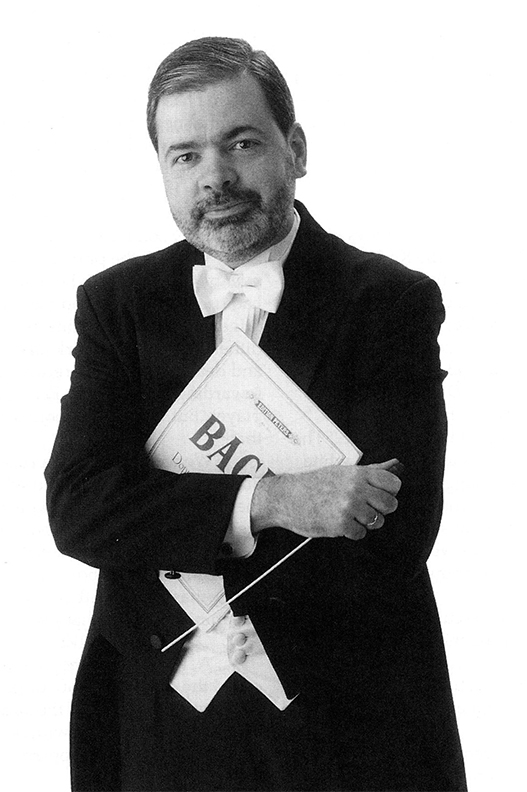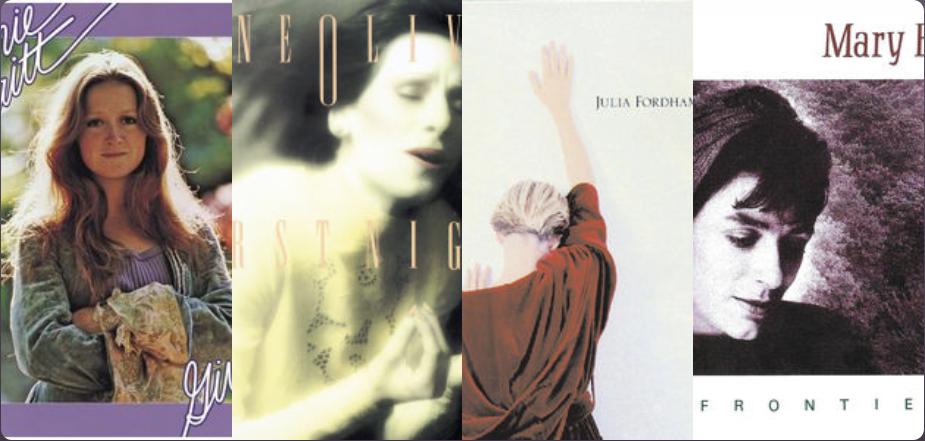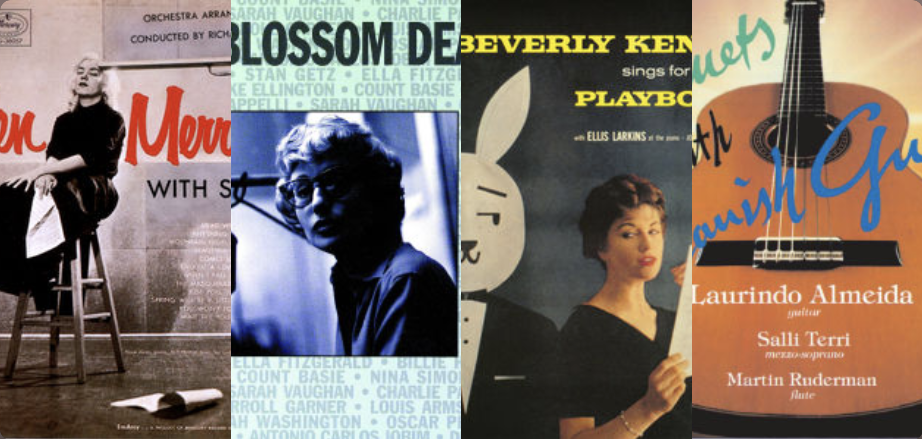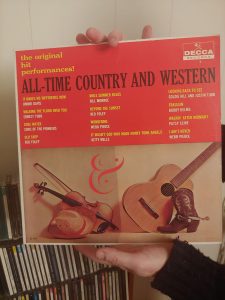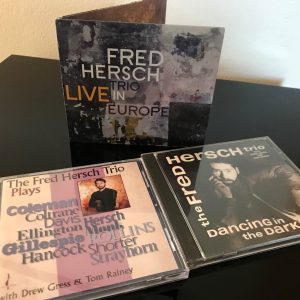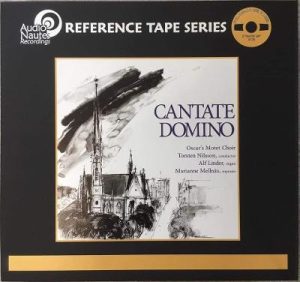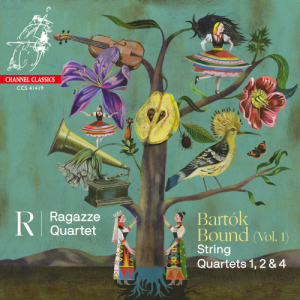Personally, I consider this to be one of the more memorable musico-poetic explorations that John Marks has done. He of The Tannhauser Gate ambushes us with not one, but two allusions, both of which left me bemused. May they do you as well as they did me!
Dr. David W. Robinson, Ye Olde Editor
An obscure poem by the English Decadent poet Ernest Dowson provided the title for a famous novel (and its classic film version) as well as a punchy line from one of Cole Porter's most innuendo-laden show tunes. The backstory is long but fascinating, so please bear with me. And there will be a little surprise for you at the end.
The above audio is from the 1956 Norman Granz sessions for Ella Fitzgerald Sings the Cole Porter Songbook. Much more below.

The Roman poet Horace (65 – 27 BC) can take credit for indirectly inspiring the title of one of the most beloved of all big-screen romances, and the title of the novel that film was based upon. The novel is Gone With the Wind. The story of where that title came from, and of Cole Porter's coy take on the title's source, sheds light on the persistence of poetry as a cultural form.
Horace wrote an ode entitled "To Venus" that included the line "Non sum qualis eram bonae sub regno Cynarae." Quite a mouthful. A workable translation is "I am not quite the same as I used to be under the reign of Cynara." Roman history lacking an empress or regent named Cynara, we are forced to conclude that Cynara reigned over, or was queen of, only the province of the poet's heart. (I believe that "Cynara" is related to the Latin word for "artichoke." "Cynara" therefore may be one of those private pet names lovers use that refer to, rather directly and strongly… well, you get it.)
The nineteenth-century English poet Ernest Dowson used that line of Horace's (and Horace's taste for irony, but not much else) for the title of one of his own retro-odes.
Fortunately for us, Dowson wrote in English. (Despite Dowson's use of Horace's complete line, Dowson's poem is usually referred to as "Cynara," because the Latin title was too daunting, even before Vatican II.)
Unfortunately for us, most people wouldn't recognize irony if it bit them. Many people regard "Cynara" as a monument to undying devotion. Generations of starry-eyed literature students have totally missed Dowson's irony.
To the text, then.
Dowson's narrator has lost his beloved Cynara. Perhaps through estrangement, but more likely by reason of her death, because he speaks of dancing through the night "to put thy pale lost lilies out of mind." The action described in the poem, however, is not mourning as we usually envision it.
The first stanza describes an encounter that is at least romantic.
Last night, ah, yesternight, betwixt her lips and mine
There fell thy shadow, Cynara! thy breath was shed
Upon my soul between the kisses and the wine;
Although there is some wiggle-room for plausible denial here (the kisses, after all, could have the capital "K" of Hershey's registered trademark), most jurors would conclude that this is an admission of both: (1) wine-drinking (was the girl of legal drinking age?); and (2) direct kissing on the lips.
Stanza two considerably ups the prosecutorial ante. I'd recommend trying for a plea-bargain.
All night upon mine heart I felt her warm heart beat,
Night-long within mine arms in love and sleep she lay;
Surely the kisses of her bought red mouth were sweet;
"Love" is the only straw the defendant here can grasp at. Based on the evidence of the poem as a whole, a claim that there was no sexual activity going on is simply laughable. But it's no slam-dunk perjury conviction, either.
Mahatma Ghandi is reputed to have shared beds with nubile young women, in order to prove the resiliency of his, uh, chastity. Is the same thing going on here? Doubtful. Most jurors will regard "love" as a euphemism for sexual activity. Of some sort.
And if that were not the case, why did money change hands; or, at least, why were her lips "bought?"
Dowson's narrator's plea in justification, his sole defense, found in the last line of each of the poem's four stanzas, resonates through the centuries, down to today:
I have been faithful to thee, Cynara! in my fashion.
The judgment of history likely will be that this affair is a private matter between Dowson's narrator and Cynara's shade. But we, the living, must move on. (Or at least some people keep saying we must "move on.")
Atlanta newspaperwoman Margaret Mitchell sent the manuscript of her Civil War romance novel off to New York with her literary agent. She included a note suggesting two possible titles: Bugles Sang Truce, and Tomorrow Is Another Day. (Lameness alert!)
Mitchell returned home, and, for relaxation, took down an anthology of British poetry. At random, she opened it to Dowson's "Non Sum Qualis Eram Bonae Sub Regno Cynarae." When her eye fell upon:
I have forgot much, Cynara! gone with the wind,
She knew she had the perfect title for her novel. Yes, everybody has seen Clark Gable in I Have Forgot Much. Usually several times.
Actually, it's Gone With the Wind, but you already knew that. You just didn't know where it came from. Mitchell's novel made Dowson's poem even more widely read.
Perceiving, perhaps instinctively, that Americans don't recognize irony until assaulted with it as a blunt instrument, Cole Porter ratcheted the obviousness quotient up several notches in his song "Always True to You In My Fashion," written for the Broadway show Kiss Me Kate. Just as Dowson borrowed his title from the text of one of Horace's Odes, Porter borrowed one phrase from Dowson's text.
Porter's song is sung by a young woman (in my opinion, passive-aggressively) telling her boyfriend about her other, seemingly more profitable, romantic relationships. The refrain assures him that she always has been true to him, in her fashion. (Ella Fitzgerald's performance remains the definitive one.)
So now to Dawson's entire magnum opus.
Non Sum Qualis Eram Bonae Sub Regno Cynarae
Last night, ah, yesternight, betwixt her lips and mine
There fell thy shadow, Cynara! Thy breath was shed
Upon my soul between the kisses and the wine;
And I was desolate and sick of an old passion,
Yea, I was desolate and bowed my head:
I have been faithful to thee, Cynara! in my fashion.
All night upon mine heart I felt her warm heart beat,
Night-long within mine arms in love and sleep she lay;
Surely the kisses of her bought red mouth were sweet;
But I was desolate and sick of an old passion,
When I awoke and found the dawn was gray:
I have been faithful to thee, Cynara! in my fashion.
I have forgot much, Cynara! gone with the wind,
Flung roses, roses riotously with the throng,
Dancing, to put thy pale, lost lilies out of mind;
But I was desolate and sick of an old passion,
Yea, all the time, because the dance was long:
I have been faithful to thee, Cynara! in my fashion.
I cried for madder music and for stronger wine,
But when the feast is finished and the lamps expire,
Then falls thy shadow, Cynara! the night is thine,
And I am desolate and sick of an old passion,
Yea, hungry for the lips of my desire:
I have been faithful to thee, Cynara! in my fashion.
Ernest Dowson
And now for the special surprise!
Years ago, before the business model of selling music on physical media was overwhelmed by, as Harold MacMillan would have said, "events," a songwriter reached out to me, hoping to find a home for his musical settings of classical poetry. I was very impressed with his work.
The problem was that my label's focus was on classical music for strings—I had not put out even a solo-piano record, and I had previously declined expressions of interest from opera singers. So, while I had to turn him down as far as a record deal went, I encouraged him as much as I could. I even suggested that he take a whack at setting Shakespeare's Sonnet 73.
To my delight, he self-published his first CD project and then did another, and on that second CD there was a wonderful Sonnet 73 setting, which I might just put up in a follow-up post. (Indeed, the title of Bill's second CD is the first part of the first line of Sonnet 73: "That time of year… .")
But for now, here's William Flanders' achingly beautiful "Cynara" setting. William Flanders (voice); Tom Saputo (piano); John Kaboff (cello).
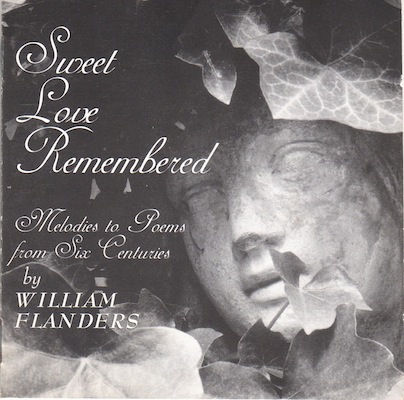
"Non Sum Qualis Eram Bonae Sub Regno Cynarae (Cynara)" (William Flanders)
Music copyright © 1996 William Flanders (ASCAP). All rights reserved.
The Sweet Love Remembered CD and three others are available from the composer/performer. Everyone, especially my Music Library Friends: Please buy this CD; and if you know any singers or voice teachers, please let them know that there are some great songs waiting to be performed and perhaps even recorded!






